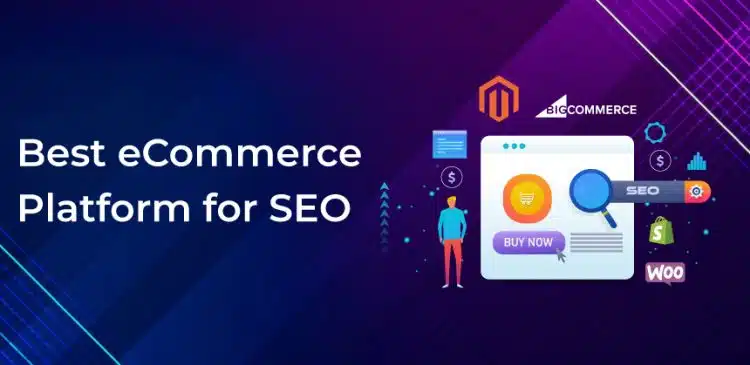Which Ecommerce Platform Is Best for SEO?

In eCommerce, where competition runs high, one effective way to drive people into your online store is through Search Engine Optimization (SEO). Among other things such as site speed and mobile optimization, the choice you make on an eCommerce platform affects greatly how you will perform in terms of SEO. This article seeks to compare and contrast different SEO functionalities that are found in common e-commerce platforms so as to enable entrepreneurs’ or businesses’ decision-making process when selecting them.
Criteria for Evaluating SEO Capabilities in eCommerce Platforms

In order to identify the best eCommerce platform for SEO, we will consider the following criteria:
I. On-Page SEO Features
- Customizable title tags, meta descriptions and URLs are necessary for optimizing individual product pages and categories. These elements enable you to customize content towards specific keywords you want to rank for.
- Using appropriate tags for headers (H1, H2, H3) and organizing content properly can make it easier for search engines to comprehend how important different parts of your pages are.
- Image optimization which includes alt tags and appropriate file names is vital for both user experience as well as search rankings.
- Mobile searches are now the most dominant form of searching, so mobile-friendliness and responsive design cannot be ignored.
II. Technical SEO
- Your position in search results is influenced by how quickly pages load and work, as well as if they support Accelerated Mobile Pages (AMP).
- SSL certificates and HTTPS support are two things that must not be ignored because of their importance to website security and SEO ranking.
- XML sitemap generation plus the ability to customize your robots.txt file is both necessary for guiding search engine crawlers.
- Canonical tags are helpful in dealing with duplicate content, a problem that frequently occurs in eCommerce.
III. Blogging and Content Marketing
- Content marketing is an essential part of SEO. Platforms that have built-in blogging features or allow easy integration with external ones are the best.
- Incorporating rich content like videos and infographics can increase engagement and boost search rankings.
- Categorizing and tagging your content makes it easier for search engines to index it.
IV. URL Structure and Redirection
- Having complete command of the URL structure is very important to have clean URLs that are user-friendly.
- Changing URLs and setting up 301 redirects help in maintaining SEO value.
- To ensure a good user experience and avoid SEO penalties, it is necessary to manage broken links (404 errors).
V. SEO Analytics and Reporting
- Enabling integration with Google Analytics, Google Search Console and similar tools help in monitoring and evaluating the effectiveness of your Search Engine Optimization (SEO).
- Providing valuable information on how you are doing is among the benefits of platforms having their own dashboards designed for SEO reporting.
VI. App Store and Third-Party Integrations
- Having SEO plugins and apps in app store makes any platform flexible and useful.
- The third-party apps or plugins integration lets you optimize your ecommerce store further by using other SEO tools like Yoast SEO or SEMrush.
VII. Customer Support and Resources
- To address SEO challenges that are particular to a platform, customer support should be focused on SEO.
- Having access to SEO guides and tutorials as well as a supportive community can be very helpful.
In-Depth Comparison of Top eCommerce Platforms
1. Shopify
Shopify is a user-friendly and highly SEO-capable platform that boasts customizable title tags, meta descriptions, and URLs. It also has built-in SSL security and is mobile responsive with fast page loads.
- Strengths: Shopify is very good at technical SEO. It has features such as automatic XML sitemap generation and canonical tags. In addition, its app store provides a wide range of SEO tools while it integrates seamlessly with Google Analytics and Search Console.
- Weaknesses: There are limited options for controlling the URL structure which may require third party apps to unlock more advanced features related to search engine optimization (SEO).
- Case Studies: Gymshark and MVMT are among the many Shopify stores that have found success by using the platform’s SEO tools to improve their search engine rankings.
2. WooCommerce (WordPress)
WordPress-based WooCommerce is very flexible and SEO-friendly; it lets you have greater control over on-page SEO aspects and URL structure. It also supports multiple SEO plugins such as Yoast SEO that enable enhanced optimization.
- Strengths: WooCommerce provides strong technical SEO functionalities, excellent blogging capabilities and smooth integration with multiple SEO tools.
- Weaknesses: WooCommerce is more demanding than other platforms from a technical point of view, and if not optimized properly it can have site speed problems.
- Case Studies: Allbirds and Porter & York are two examples of companies that have boosted their online presence using the search engine optimization capabilities of WooCommerce.
3. Magento
Magento is an extremely powerful eCommerce platform that is meant for bigger businesses with more complicated needs. It has a wide range of SEO features including the ability to control everything from URLs to meta tags and product descriptions.
- Strengths: Magento is very good at dealing with big product lists and has a lot of strong technical SEO features such as schema mark-up that helps with rich snippets in the search results.
- Weaknesses: Magento is known to consume a lot of resources; thus, it might be necessary to hire a dedicated group of developers for its efficient management.
- Case Studies: Search rankings have been enhanced by many companies such as Helly Hansen and Ford through the use of advanced SEO features that are available in Magento.
4. BigCommerce
BigCommerce is considered to be a good choice for all businesses, regardless of their size. In addition to this, the system also offers customizable URLs, meta tags as well as an included blogging platform.
- Strengths: BigCommerce is known for its quick loading speeds on pages, optimization for mobile devices, and the support of automatic HTTPS. It also connects seamlessly with Google services.
- Weaknesses:BigCommerce is easy to use, but it does not offer the same level of flexibility or customization as platforms such as WooCommerce.
- Case Studies: BigCommerce’s SEO-friendly features have helped companies such as Skullcandyand Ben & Jerry’s drive traffic and sales.
5. Wix eCommerce
Wix is famous for being user-friendly, especially for small businesses and beginners. It has a good selection of SEO tools that can be customized such as meta tags, alt attributes for images and mobile optimization.
- Strengths: Wix is a platform that is easily accessible. It has an intuitive interface where users can drag and drop elements on their page. Also, it comes with SEO tools that are integrated into the website builder making optimization simple as pie!
- Weaknesses: The scalability of Wix is limited, and some advanced SEO features need additional apps or are not as strong as those offered in WooCommerce and Shopify platforms.
- Case Studies: Wix is more recommended for smaller businesses as opposed to those operating on a large scale. Businesses such as OhSoBright and Wine Searcher have gained momentum through the SEO features offered by Wix.
6. Squarespace
Squarespace is a design-centered platform that focuses mainly on images. It has some features for SEO or search engine optimization, like meta tags which can be changed and mobile optimization done automatically.
- Strengths: Squarespace is the best choice for companies that focus on design and content advertising because it has powerful visual content support as well as blogging.
- Weaknesses: Squarespace’s ability to perform SEO is quite restricted, as it has less influence over the structure of URLs and does not offer as many advanced SEO functions.
- Case Studies: Arch Motorcycle, a venture by Keanu Reeves is an example of artistic businesses and personal brands that use Squarespace.
Conclusion
Every SEO platform has its pros and cons. Shopify and BigCommerce are perfect for those who want user-friendly interface with strong technical SEO. For individuals in need of customization and advanced content marketing, WooCommerce is the way to go. Magento suits best for large complicated sites that have a lot of product catalogs while Wix and Squarespace are good for smaller businesses that want something easy to use and designed nicely.
Final Recommendation
- Best Overall: The best for SEO is WooCommerce and Shopify since it is highly flexible and powerful, allowing many customizations and comes with advanced functionalities.
- Best for Large Enterprises: For companies with complex SEO requirements, Magento is the platform that is preferred.
- Best for Small Businesses: Wix provides easy-to-use solutions that have enough SEO capabilities for small businesses.


 Bill Yeager, Co-Owner of High Point SEO & Marketing in CT
Bill Yeager, Co-Owner of High Point SEO & Marketing in CT